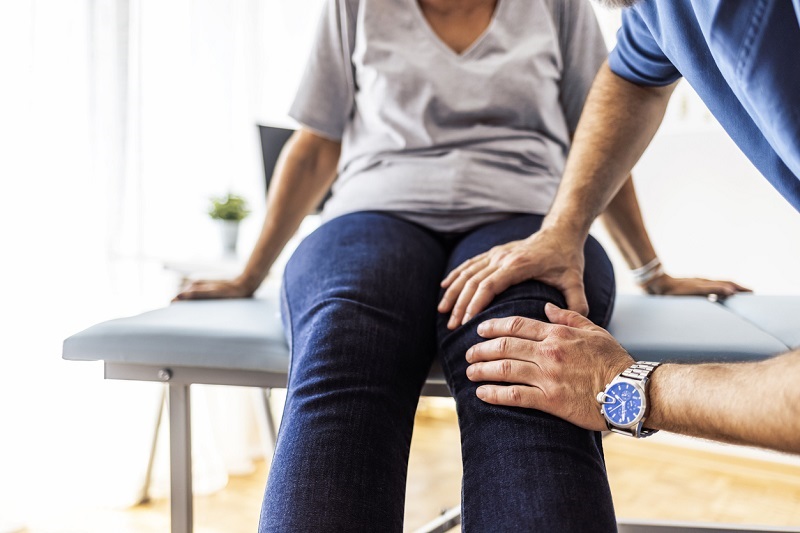Nine Ways to Slow Osteoarthritis Progression

November 13, 2023
Osteoarthritis affects approximately 32.5 million adults in the United States and is the most common type of arthritis. It occurs when cartilage—the flexible tissue in the joint—wears down, causing bones to rub together directly. This causes inflammation, pain and swelling.
Currently, there is no cure for osteoarthritis, and it can worsen over time. While it is more common as you age, especially after the age of 50, joint deterioration and pain isn’t necessarily inevitable.
Our expert, Thomas K. John, M.D., FAAOS, orthopedic surgeon at Hackensack University Medical Center and Mountainside Medical Center, shares nine ways to help fend off osteoarthritis and further joint damage and deterioration.
1. Don’t Ignore Early Symptoms
It’s easy to assume aches and pains are fleeting and not a sign of a progressive problem, but an early diagnosis can allow you and your doctor to minimize risk factors and slow its effects. This is especially important for those who have a family history of osteoarthritis since they are at a higher risk.
“It is important to identify osteoarthritis early. Don’t blow off symptoms,” says Dr. John.
2. Reduce Body Mass Index (BMI)
Every pound of extra weight adds nearly four pounds of stress on your knees and six pounds on your hips, according to the Arthritis Foundation.
Also, extra weight can promote inflammation in the body, which destroys cartilage cells. “Reducing your BMI will reduce the burden on your joints,” says Dr. John.
3. Exercise Regularly
Exercise will not only help you maintain a healthy body weight, but it will also strengthen your muscles and relieve unnecessary pressure on your joints.
- This is best accomplished with low impact activities such as cycling or swimming.
- Depending on your fitness level and joint condition, if you participate in higher-impact exercise like running, you might need to consider low-impact activities such as cycling or swimming.
“For those who have never really exercised, physical therapy is great to get people started,” Dr. John says. Physical therapy can teach how to strengthen muscles safely and efficiently, but it’s only effective when you continue the exercises at home.
4. Get Proper Nutrition
In addition to helping you maintain a healthy weight, proper nutrition helps you maintain blood sugar and get the necessary nutrients to reduce inflammation.
Some preliminary research suggests that vitamin E, which can be found in green leafy vegetables, can improve joint health. Dr. John cautions that there is not hard scientific evidence to prove this, but vitamin E is generally safe in a moderate amount.
5. Get Adequate Hydration
“Water is a principal component of cartilage,” Dr. John says, adding that staying hydrated can reduce friction and thus reduce joint pain. Staying hydrated can also flush out toxins and decrease inflammation.
6. Use Supportive Devices
“In the very early stages of osteoarthritis, I don’t advise using devices,” says Dr. John. “It’s best if your body can adapt and react on its own. However, more advanced arthritic knees with deformities can benefit from specialized unloader braces.”
But for those who are in more advanced stages of osteoarthritis, devices such as shoe inserts and braces can reduce stress on the joints and prevent additional deterioration.
7. Quit Smoking
Smoking is known to have a vast range of negative effects on health, including joint health. It can cause blood flow changes, which can affect the cartilage in your joints by impeding cartilage repair. This ultimately contributes to cartilage loss.
Smoking also can make exercise difficult, further contributing to joint deterioration.
8. Reduce Alcohol Intake
While no direct evidence shows that alcohol causes or contributes to joint damage—and some studies even show that red wine’s anti-inflammatory properties may help—moderation is key.
Drinking in excess can override any positive anti-inflammatory effects red wine may have. It will also usually inhibit other good behaviors. “Alcohol can reduce activity, which will likely increase BMI. It can also negatively impact hydration,” Dr. John says.
9. Get Rest and Reduce Stress
“Sleep and stress affect overall well-being, so they have an indirect effect on joint health,” Dr. John says.
- Proper sleep can give the needed energy boost to exercise and make better decisions as you go about your day to day.
- Reducing stress helps keep proper blood sugar levels and decrease the amount of inflammation in the body.
Next Steps & Resources:
- Meet our source: Thomas K. John, M.D., FAAOS
- Make an appointment online with an orthopedic doctor near you, or call 800-822-8905.
- Learn about orthopedic services at Mountainside Medical Center.
The material provided through Healthier You is intended to be used as general information only and should not replace the advice of your physician. Always consult your physician for individual care.







